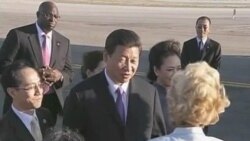WASHINGTON —
At the informal summit meeting between President Barack Obama and his Chinese counterpart Xi Jinping in California, both sides are trying to avoid the conflicts that can afflict relations between rising and established powers. China's main concern is that the new focus of U.S. foreign policy toward the Asia-Pacific region - the so-called "pivot" - is aimed at containing China's rise.
Xi became president of China in March. This is his first visit to the United States as head of state.
Though Washington has its own list of issues to discuss with Xi, at the top of Beijing's agenda is the U.S. pivot to Asia, which it sees as an attempt to prevent China from becoming a superpower.
Senior U.S. officials have tried to reassure the Chinese that the pivot is not aimed at encircling China, as Beijing fears. The Hudson Institute's Michael Pillsbury also is a consultant to the Pentagon.
"In eight major speeches now, every one says this is not aimed at China, this is not about China. The only problem is, in ancient Chinese statecraft, they see this as the hegemon trying to reassure the rising power, but ‘we Chinese are not so stupid as to believe this’ - but I think they should believe it," said Pillsbury.
Other analysts disagree with that approach, saying constant denial may not be the best way to handle China. Kelley Currie is senior fellow at Project 2049, a Washington research institute that focuses on East Asian security.
"When we deny that it's all about China, it makes them even more suspicious. So I think we need to be honest... that yes, part of it is about hedging and about the uncertainty that our allies in the region and our friends in the region feel about the behavior coming out of the People's Republic of China," said Currie.
Wei Jingsheng is a leading Chinese dissident living in exile. He said that as long as China remains under one-party rule, the U.S. should not expect a genuinely cooperative relationship with China.
"America's social and political system is very attractive to ordinary people in China, and this, the communist government in China feels, is a fundamental threat to the government's survival," he said.
The U.S. has accused China of conducting cyber-espionage against it and says many such efforts are directly overseen from a complex in Shanghai run by a special unit of China's military. Such activity has caused China's image in the U.S. Congress to suffer.
"Well, I think it's more negative toward China, particularly because of cyber. China is stealing from us - intellectual property," said Republican Congressman Frank Wolf.
Washington also has asked China to use its influence to alter recent provocative behavior by North Korea. Just before the summit, the North said it was willing to engage in talks with South Korea. Analysts in Beijing are calling that a "gift" to Obama, and they say Washington's response may indicate how the United States views the new big-power relationship that Xi says he would like to see.
Xi became president of China in March. This is his first visit to the United States as head of state.
Though Washington has its own list of issues to discuss with Xi, at the top of Beijing's agenda is the U.S. pivot to Asia, which it sees as an attempt to prevent China from becoming a superpower.
Senior U.S. officials have tried to reassure the Chinese that the pivot is not aimed at encircling China, as Beijing fears. The Hudson Institute's Michael Pillsbury also is a consultant to the Pentagon.
"In eight major speeches now, every one says this is not aimed at China, this is not about China. The only problem is, in ancient Chinese statecraft, they see this as the hegemon trying to reassure the rising power, but ‘we Chinese are not so stupid as to believe this’ - but I think they should believe it," said Pillsbury.
Other analysts disagree with that approach, saying constant denial may not be the best way to handle China. Kelley Currie is senior fellow at Project 2049, a Washington research institute that focuses on East Asian security.
"When we deny that it's all about China, it makes them even more suspicious. So I think we need to be honest... that yes, part of it is about hedging and about the uncertainty that our allies in the region and our friends in the region feel about the behavior coming out of the People's Republic of China," said Currie.
Wei Jingsheng is a leading Chinese dissident living in exile. He said that as long as China remains under one-party rule, the U.S. should not expect a genuinely cooperative relationship with China.
"America's social and political system is very attractive to ordinary people in China, and this, the communist government in China feels, is a fundamental threat to the government's survival," he said.
The U.S. has accused China of conducting cyber-espionage against it and says many such efforts are directly overseen from a complex in Shanghai run by a special unit of China's military. Such activity has caused China's image in the U.S. Congress to suffer.
"Well, I think it's more negative toward China, particularly because of cyber. China is stealing from us - intellectual property," said Republican Congressman Frank Wolf.
Washington also has asked China to use its influence to alter recent provocative behavior by North Korea. Just before the summit, the North said it was willing to engage in talks with South Korea. Analysts in Beijing are calling that a "gift" to Obama, and they say Washington's response may indicate how the United States views the new big-power relationship that Xi says he would like to see.





